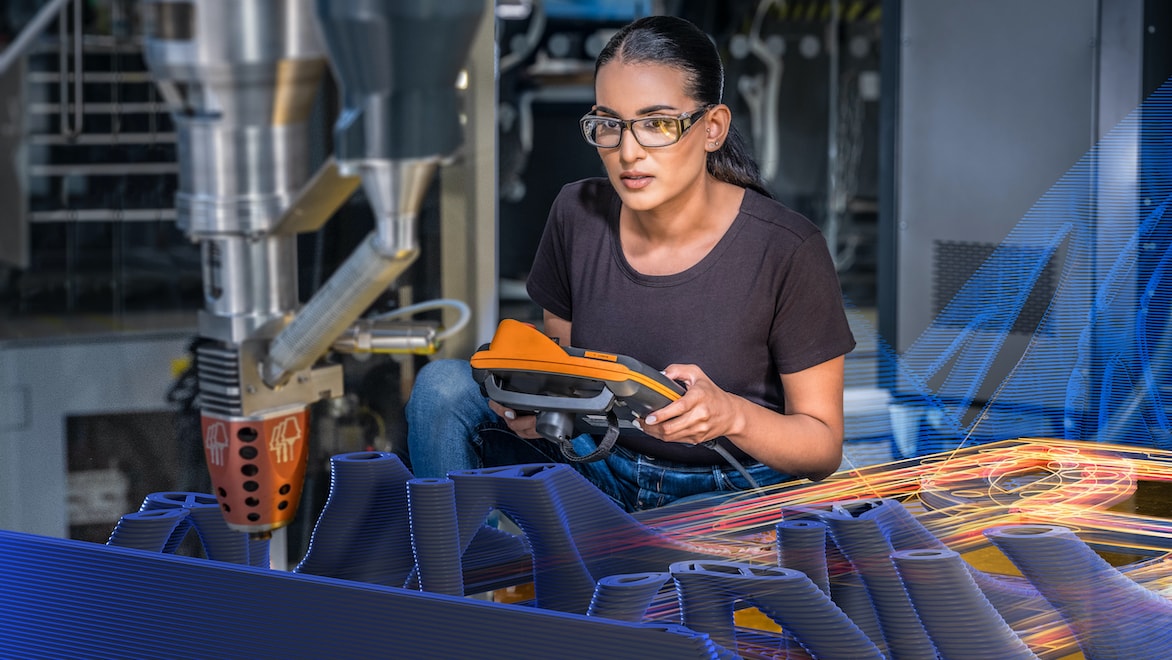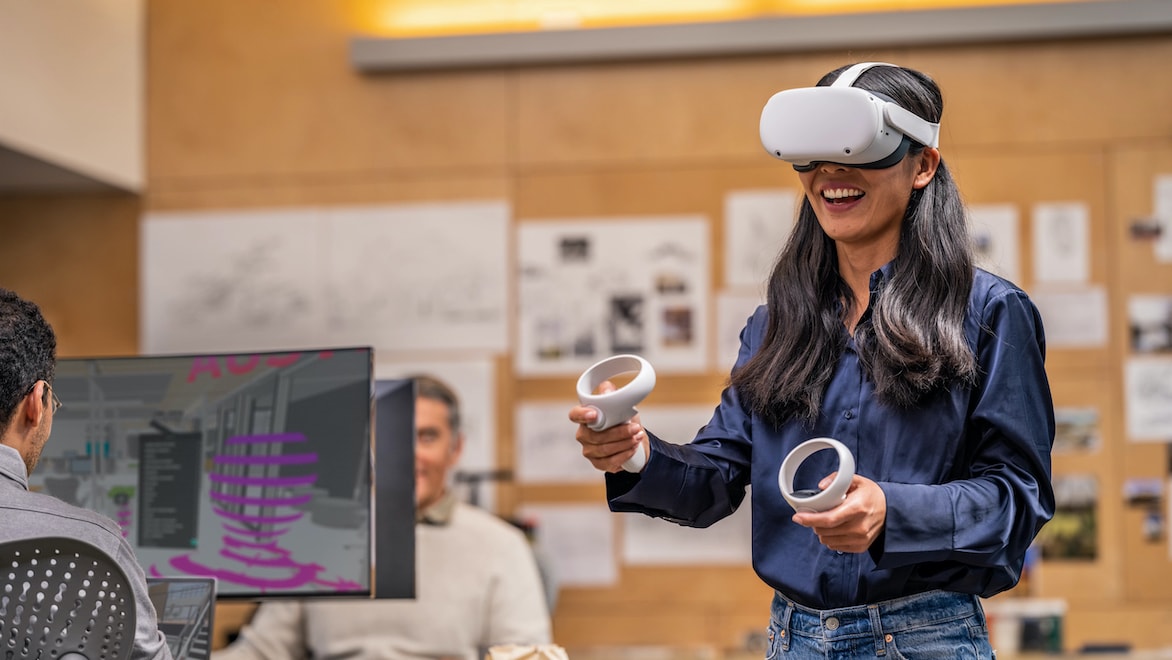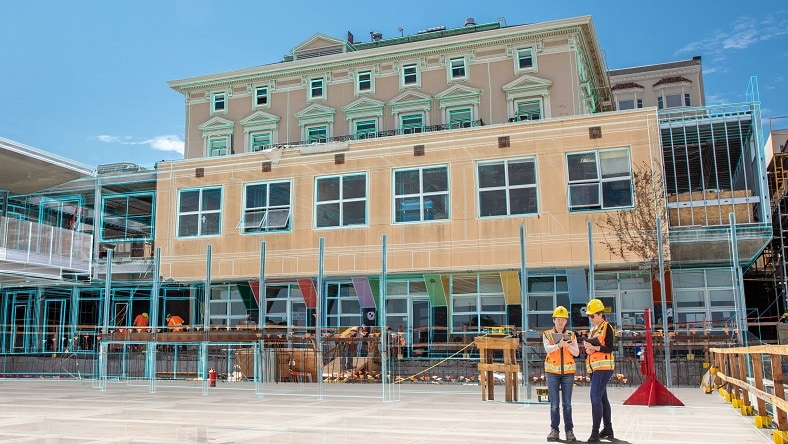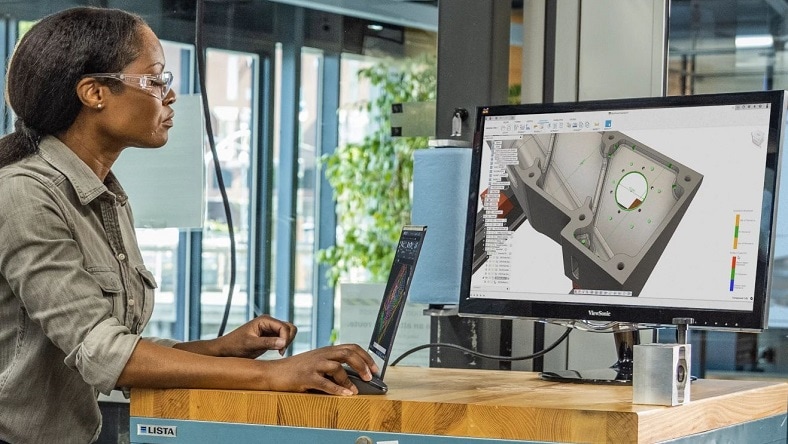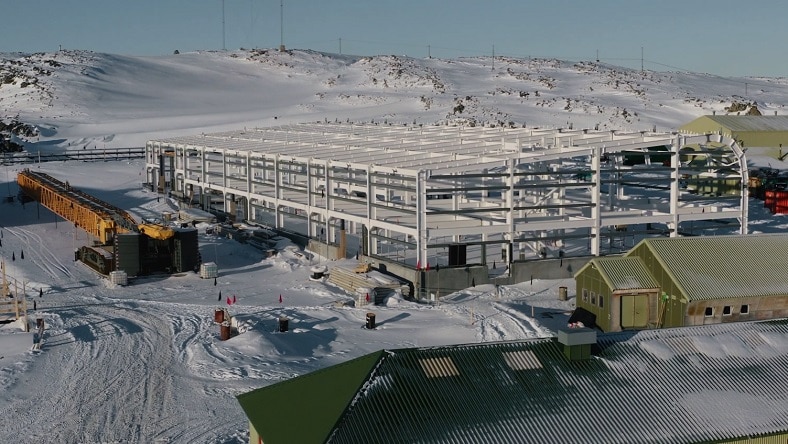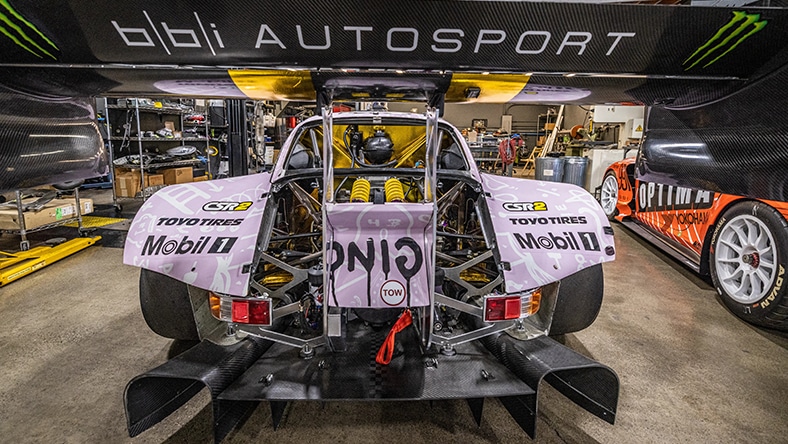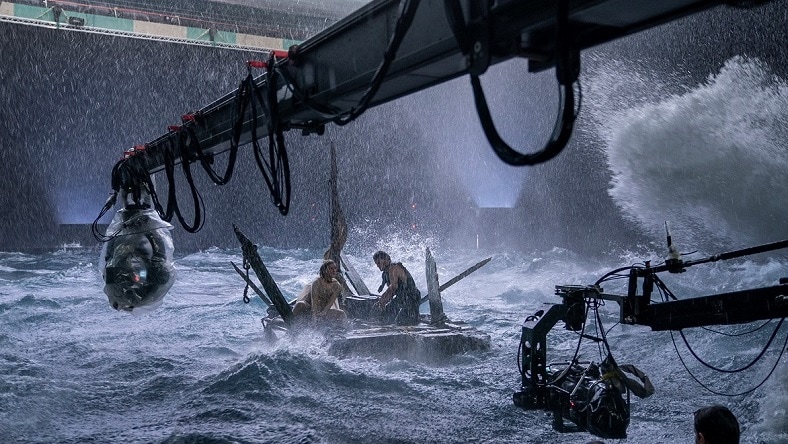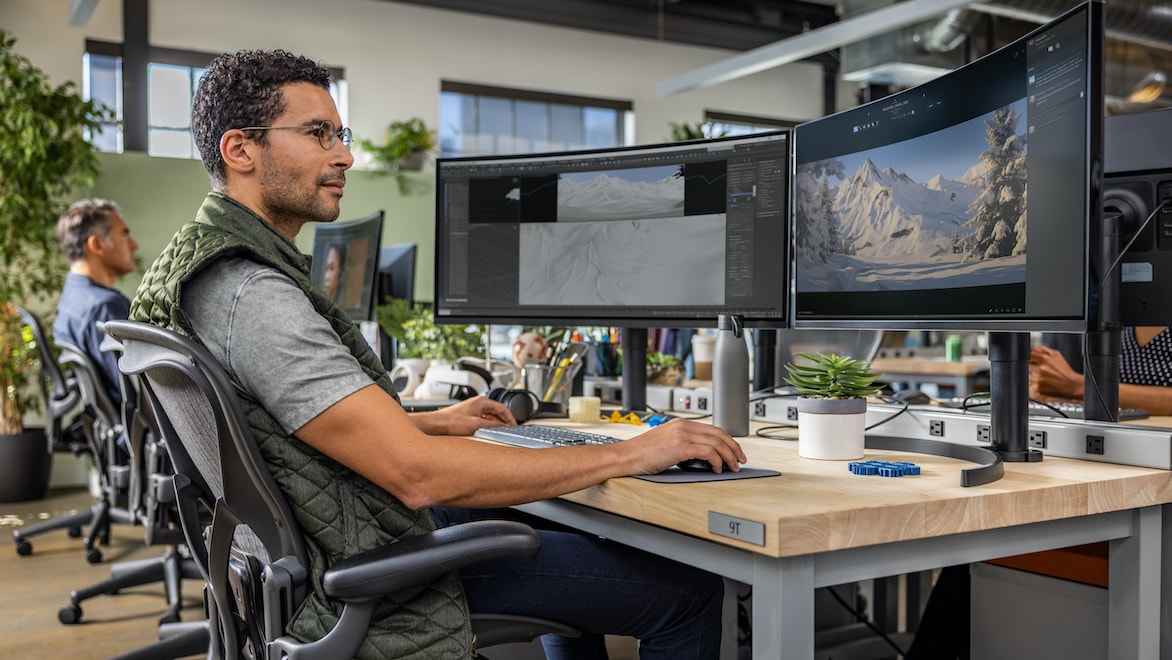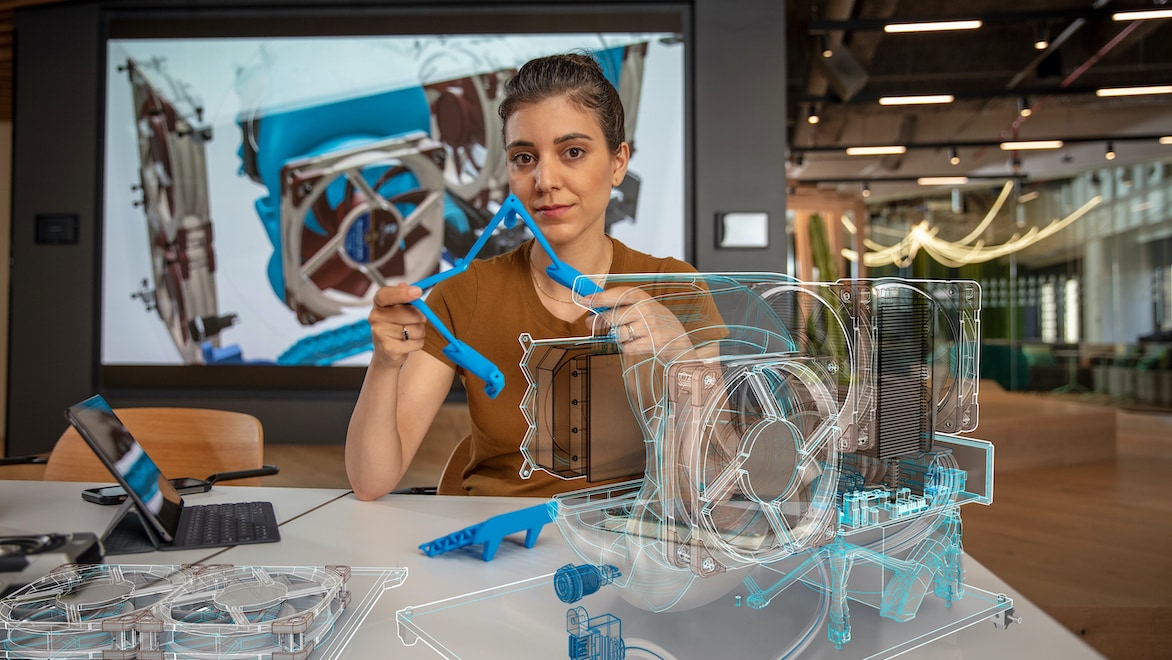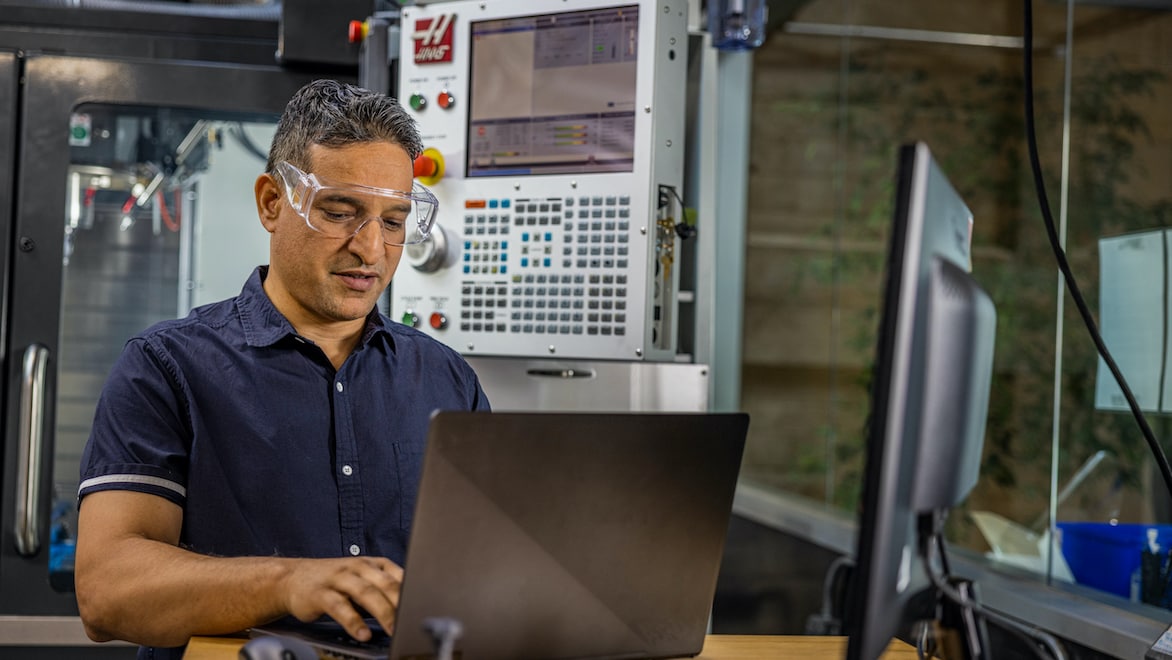& Construction

Integrated BIM tools, including Revit, AutoCAD, and Civil 3D
& Manufacturing

Professional CAD/CAM tools built on Inventor and AutoCAD
A Design and Make Platform includes integrated cloud-connected software solutions that allow users to design, manufacture, and deliver anything from new buildings and infrastructure to products and media-and-entertainment productions. Design and Make Platforms unlock data and connect project workflows, allowing companies to deliver better, faster outcomes across the project lifecycle.
A Design and Make Platform uses cloud-connected software to create a single source of data. By creating a silo-free ecosystem to collaborate, teams can work from the same digital model for seamless end-to-end workflows. It is the next evolution of work for Design and Make industries such as architecture, engineering, construction, and operation (AECO); design and manufacturing (D&M); and media and entertainment (M&E).
From start to finish, a Design and Make Platform brings all stakeholders together for a common data experience. Whether constructing a new high-rise, manufacturing new products, or producing a media asset, working with cloud-connected tools powers automation and unlocks valuable insights for better decisions at every stage. Design and Make Platforms connect digital and physical processes in the cloud to create the places, products, and experiences that transform the way people live, work, and play.
A Design and Make Platform shifts the focus from documents to data. Stationed in the cloud, Design and Make Platforms create open environments for transparency across the entire design-to-delivery process.
A Design and Make Platform:
Without a Design and Make Platform, people, processes, and data are siloed. Software and files are incompatible, forcing different teams to patch together workflows to assemble a single project. Information gets lost during handoffs from one discipline to the next. And without the means to extract valuable insights, the true value of data goes to waste.
In fact, International Data Corporation (IDC) projects that 80% of all business data will go unused by 2025. Companies using antiquated tools and processes are falling behind, unable to compete in an increasingly digital and automated world fueled by artificial intelligence (AI).
A Design and Make Platform benefits teams and people who create spaces, objects, and content. Working in a common environment streamlines processes that require the collaboration of multiple teams and stakeholders.
With the world’s population expected to reach 10 billion by 2050, the AECO industry is trying to keep up with demand for infrastructure in a built environment that is already responsible for 40% of the world’s carbon emissions. But the fragmentation of traditional workflows can cause projects to be 80% over budget and take 20% longer than scheduled.
To meet demand and address these inefficiencies, the industry needs to accelerate digital capabilities with Design and Make Platforms. And when it comes to building information modeling (BIM)—the holistic process of creating and managing data for a built asset—cloud-powered AECO will unify BIM workflows with connected data and digital models to allow builders to cut waste, save money, and reduce rework.
As the demand for goods goes up, D&M still faces some of its longstanding challenges, like siloed data, supply chain vulnerability, and a skilled labor shortage.
With Design and Make Platforms, generative design—a form of AI that produces myriad solutions to defined engineering problems—takes the lead to boost innovation, reduce waste, and accelerate time-to-market. Companies can build multipolar supply chains. Factories are upgraded to digital factories—fully connected, energy-efficient facilities that move processes to the cloud and converge design-to-delivery workflows.
M&E productions are collaborative ventures involving hundreds of people. But each team’s view is often isolated to its own workflows. As projects become more complex and generate petabytes of data, Design and Make Platforms allow better asset management through a centralized hub. Teams can view footage from anywhere almost as soon as the director yells “cut!” This brings everyone together in one cohesive experience by creating a connected pipeline from script to screen.
Sustainable construction
With connected data, the British Antarctic Survey coordinated with multiple teams around the globe to save more than 700 tons of carbon emissions on the construction of a new research facility.
Image courtesy of British Antarctic Survey
Connected manufacturing
BBi Autosport builds customized race cars to compete in motor sports and then transforms what it learns from those high-performance vehicles into aftermarket parts for its consumer-products business.
Image courtesy of BBi Autosport
Cloud-based production
One of today’s biggest media producers, Amazon Studios has moved most of its productions to the cloud for connected pipelines and more efficient data management.
Image courtesy of Amazon Studios
Autodesk’s Design and Make Platform is Autodesk Platform and the key cloud-connected software products—such as AutoCAD, Revit, Inventor, 3ds Max, and Maya—whose capabilities are the basis of Autodesk’s emerging industry clouds: Forma, Fusion, and Flow.
Autodesk Platform encompasses those industry clouds as well as Autodesk Platform Services, a set of common APIs. Autodesk’s Design and Make Platform is the next stage of digital transformation, providing a single environment that connects teams, data, and workflows across entire project lifecycles.
In today’s world, companies must be ready for unanticipated changes. Working with connected data is the one common denominator among companies that can withstand the impact of disruption and meet the skyrocketing demand for places, products, and content. The 2023 State of Design & Make report states that 72% of digitally mature companies are confident in the ability to handle rapid change while only 52% of less digitally mature companies are equipped to handle it.
One of the key tenets of a Design and Make Platform is building resilience to future-proof businesses and prepare for the challenges ahead.
By synchronizing data, insights, and automation through connected workflows, Design and Make Platforms create a perfect foundation for innovation and efficiency.
Design and Make Platforms bring everyone together to work from the same data for faster output.
With a cloud-based platform, stakeholders can work from anywhere—on any device.
Improved efficiency means cost reductions: Less waste, less rework, faster output.
With centralized data, stakeholders can access the specific information they need when they need it.
More efficiency provides a greater capacity to develop new ideas and innovate.
Reducing rework and waste generation delivers more sustainable outcomes and fewer emissions.
Hand off manual, repetitive processes to digital tools for fewer errors and faster output, and free up people to work on value-added activities.
Teams work more efficiently and sustainably from one central cloud information model instead of multiple, siloed models with incompatible tools.
Here are today’s change drivers that make Design and Make Platforms a necessary business strategy.
As the world changes, design and make industries must adapt and evolve. In this next era of work, when data flows freely between software and stakeholders, productivity increases, empowering companies to be more agile and responsive.
Design and Make Platforms are the apex of digital maturity, connecting data and unlocking insights that accelerate innovation and deliver better business outcomes that will pave the way to a more resilient and sustainable future.
Design and Make refers to processes and industries that connect the digital to the physical. Architecture, engineering, construction, product design, manufacturing, gaming, and filmmaking all involve processes that extend from design to the delivery of a physical result.
Design and Make Platforms are integrated, cloud-connected software solutions that allow users to design, manufacture, and deliver anything from new buildings and infrastructure to products and media-and-entertainment productions. Design and Make Platforms unlock data and connect project workflows, allowing companies to deliver better, faster outcomes across the project lifecycle.
Companies worldwide face a rapid evolution in business trends and practices, from the way people work to the way supply chains operate. Demographic pressures, shifting consumer priorities, and demand for sustainable solutions are creating challenges across every industry. Traditional siloed tools and ways of working no longer meet these needs. Therefore, industries are witnessing a shift toward cloud-connected and integrated software solutions and data-driven approaches to address today’s challenges.
Through Autodesk Platform, we can help customers connect workflows and surface automation and insights across design and make industries, including architecture, engineering, construction, product design, manufacturing, media, and entertainment.
Autodesk Platform unlocks the value of data and enables collaboration across the entire project lifecycle by:
In the Autodesk Platform environment, it won’t matter if an architect is working in Revit or Forma, an engineer in Inventor or Fusion, or an artist in Maya or Flow. Their data will be connected in the industry cloud, with APIs and services helping to optimize and customize it.
